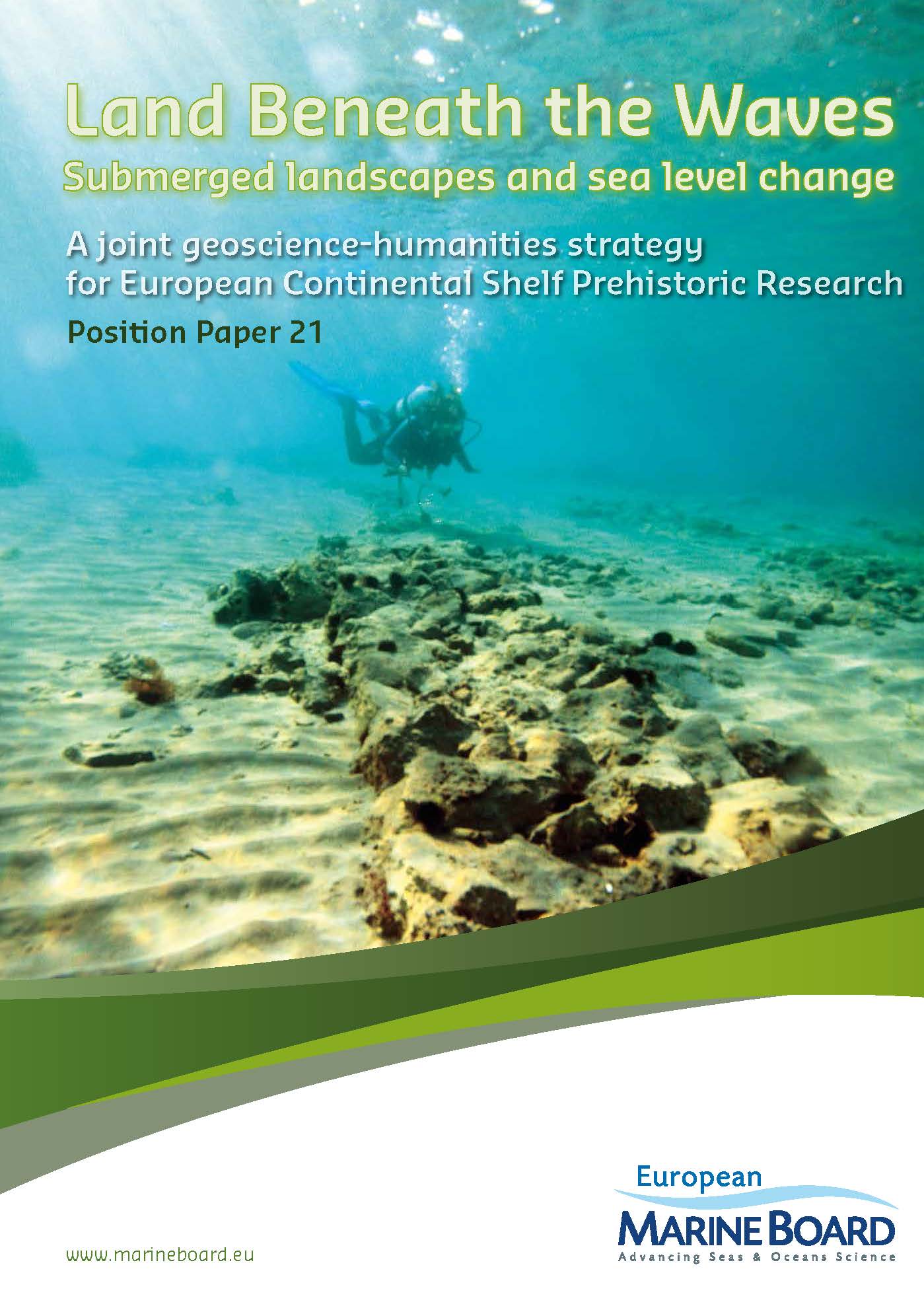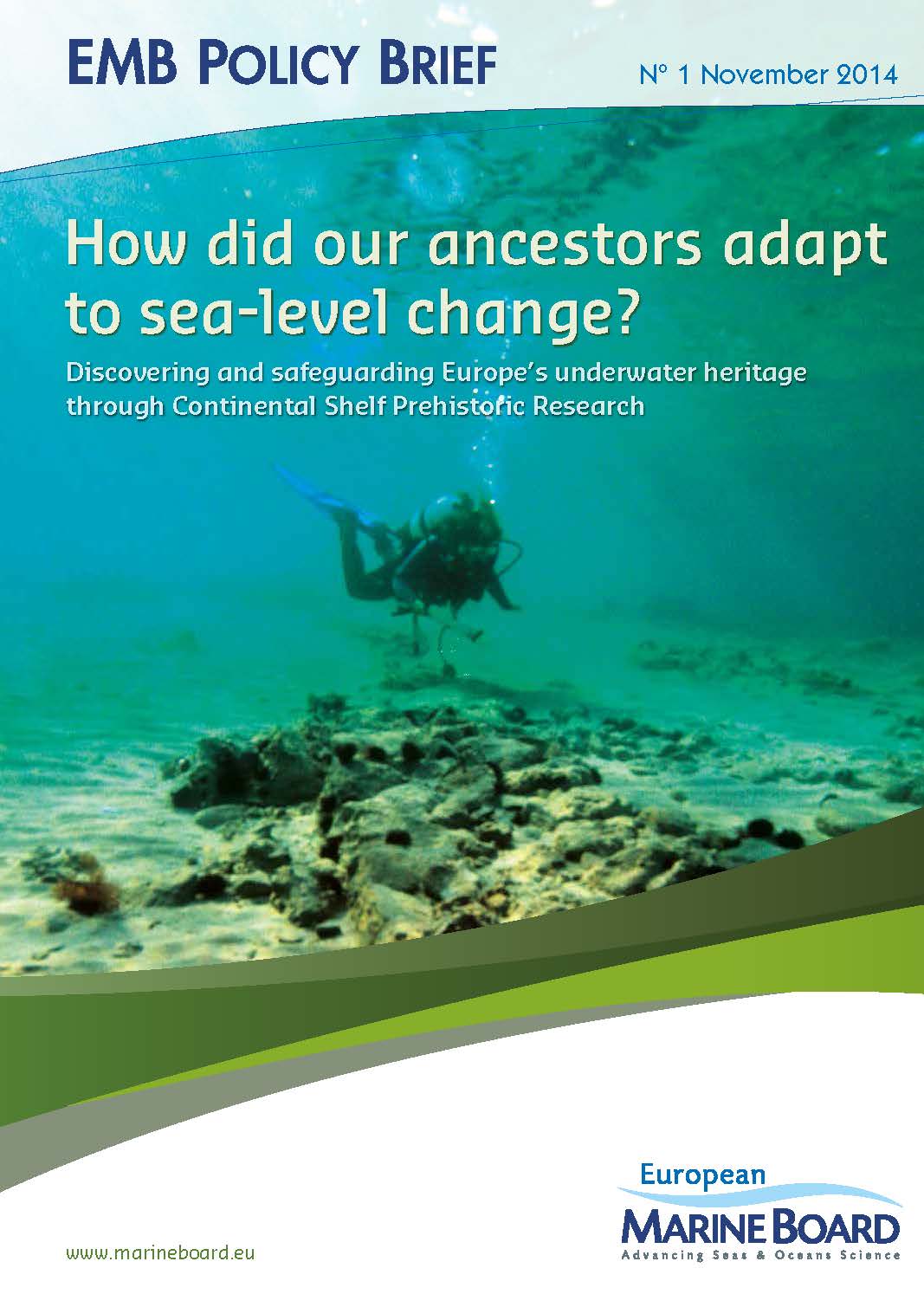Outputs:
 Position Paper 21, Land Beneath the Waves, Submerged landscapes and sea level change (October 2014)
Position Paper 21, Land Beneath the Waves, Submerged landscapes and sea level change (October 2014)
News release for the publication (October 2014)
 Policy Brief 1, How our ancestors adapted to sea-level change? (October 2014)
Policy Brief 1, How our ancestors adapted to sea-level change? (October 2014)
EMB Science Webinar on Submerged Prehistoric Landscapes (October 2020)
Background
An extensive (extra 40% of the existing European land mass) landscape was exposed on the continental shelf during the last glacial maximum 20,000 years ago. This now-drowned landscape is known to preserve extensive records of paleo-shorelines and other traces of the original landscape topography, fluvial and lacustrine sediments. Furthermore, paleo-environmental and archaeological records of human activity, which hold valuable information on the long-term history of human settlements and of sea-level and climate change can be found. The preservation of this substantial part of Europe's prehistory is being threatened by natural erosion and commercial maritime activities. A major increase in our efforts to explore these submerged prehistoric settlements is urgently needed to safeguard this heritage and support sustainable management of our coastal and offshore resources.
Objectives
Recognize the importance of studying the submerged landscape and prehistoric settlements and the implications for future climate change impact.
- Identify the contribution of seabed research on the European continental shelf to the overall reconstruction of the successive stages of hominin occupation and abandonment of European regions during the last 1 million years.
- Identify expertise across the marine and social sciences, including observing infrastructures, analytical equipment, technical support and research facilities, including the substantial task of integrating and interpreting existing digital data on the continental shelf so as to identify the Pleistocene landscape signal.
- Integrate interdisciplinary knowledge in underwater research, especially in relation to prehistoric social change.
- Highlight this knowledge for wider public’s awareness on prehistoric human-marine interaction.
- Formulate recommendations to foster the process of Marine Spatial Planning policy through proposing methods on managements and preservations of submerged archaeological settlements.
Related activities
- European Commission Horizon 2020 Societal Challenge 5 WP2018-2019-2020 Public Consultation (April, 2016) - In the response (Download) issued by the European Marine Board, we reiterate the recommendations from the WG SUBLAND and stress that developing public interest around the discoveries of ancient human settlement remains found in coastal seas has enormous potential to both tourism and awareness of how our ancestors adapted to sea level rise.
- Promoting WG SUBLAND & OC Nexus Consensus Statement during UN Climate Talks (COP21) (3 December 2015, Le Bourget, Paris) - The recommendations from WG SUBLAND and Ocean-Climate Nexus Consensus Statement were presented at a UNESCO workshop 'Understanding the History of Climate Change and Sea level Rise' in the Climate Generation Areas of the Le Bourget site.
- EU-UNESCO information meeting on underwater cultural heritage - protection and opportunities (1 October 2015, Brussels) - European Marine Board former Vice Chair, Prof. Ricardo Serrão Santos MEP, hosted a scientific briefing (1 October) at the European Parliament on underwater cultural heritage organized by the European Commission and UNESCO. The work from EMB WG SUBLAND was listed as references to this information meeting. Several working group experts and scientists from the community attended and discussed with policy makers about its protection and opportunities (further information pdf).
- European Maritime Day 2015 Workshop "Maritime Culture Heritage & Blue Growth: What's the Connection" (28 May 2015, Athens) - The workshop highlighted the significant but largely unknown cultural heritage of human settlements that exist in the shallow shelf seas around Europe. Jointly presented by research, industry and heritage management organizations, this workshop showcased that the offshore economy can benefit from a cross-sectoral interaction to safeguard archaeological finds, to aid in their discovery and management, and to avoid unnecessary delays for commercial activities. Workshop programme, summary and report.
- EC Public Consultation (June 2014) - Response to Horizon2020 SC5 stakeholder consultation (EMB response SC5_pdf). In the analysis report (EC report_pdf) from the 139 contributions, Continental Shelf Prehistoric Research is listed as one of the eight climate change-related research topics needed to be financed. (EC H2020 news page)
- Survey to national cultural heritage agencies in Europe - In 2014, the WG conducted a survey to cultural heritage agencies in Europe. The survey provided best available information about the activities and policies of national departments and agencies regarding the submerged prehistoric sites on the continental shelf within national jurisdiction. More information see EASME website.
Meetings
- 1 April 2014, Athens, Greece
- 12 December 2013, Brussels, Belgium
- 26 September 2013, Szczecin, Poland
Members
Chair: Nicholas Flemming, affiliated with NOC, UK
Working Group members:
Namık Çağatay, Istanbul Technical University, Turkey
Nena Galanidou, University of Crete, Greece
Hauke Jöns, Lower Saxony Institute for Historical Coastal Research, Germany
Francesco Latino Chiocci, University of Rome "La Sapienza", Italy
Gilles Lericolais, French Research Institute for Exploration of the Sea, France
Tine Missiaen, Ghent University, Belgium
Fionnbarr Moore, National Monuments Service Department of Arts, Heritage and Gaeltacht, Ireland
Alar Rosentau, University of Tartu, Estonia
Dimitris Sakellariou, Hellenic Centre for Marine Research, Greece
Birgitte Skar, Norwegian University of Science and Technology, Norway
Alan Stevenson, British Geological Survey, UK
Henk Weerts, Cultural Heritage Agency, Netherlands
Contact at European Marine Board Secretariat: Email